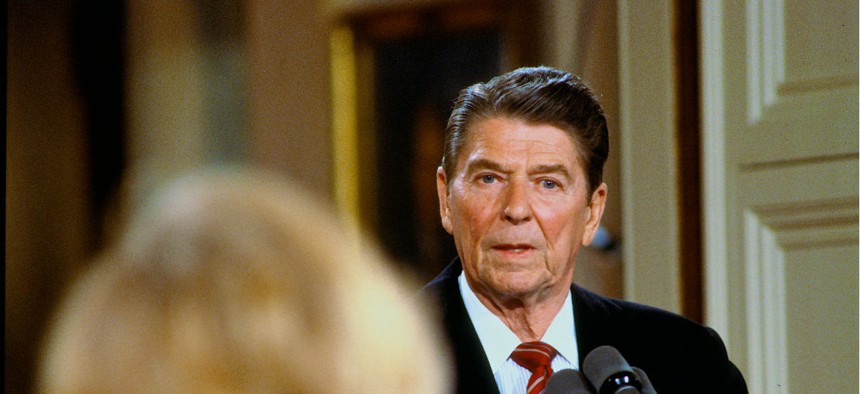
On May 22, 1984, then-President Ronald Reagan answers reporter's question during news conference in the East Room of the White House. mark reinstein/Shutterstock.com
Analysis: I Assessed a President's Fitness to Serve—But I Didn't Write an Op-Ed
When my colleague became worried about President Reagan, he took his concerns to the chief of staff—not a newspaper.
The anonymous senior official in the Trump administration who published an op-ed in The New York Times on Wednesday describing an internal “resistance” movement is, as the White House put it, a coward. If the writer truly believes the president is not fit to lead the country, he should have done what my colleague James Cannon did when he had similar reservations about President Ronald Reagan.
I served for many years as an aide to Senator Howard Baker of Tennessee. When Baker took over from Don Regan as Reagan’s chief of staff, I went over to the White House as an assistant to the president. It was a time of political crisis. The Iran-Contra scandal had recently been exposed. Some wondered if the upcoming congressional hearings would implicate the White House and the president. Others doubted that the president was up to the task of negotiating with Mikhail Gorbachev, the charismatic leader of the Soviet Union.
Reagan’s health, meanwhile, was less than optimal. For several weeks in the fall of 1986 the president had been recuperating from surgery. Would he be able to adequately perform his duties?
Things were bad enough that Baker’s former Senate colleagues assumed he would become the behind-the-scenes decision maker, the power behind the president.
That was never the case. But Baker, who’d heard tell of disorder at the White House, asked me and Jim Cannon, another longtime aide, to interview staffers and find out what was going on. I thought it was rather a mess, but Jim was positively disturbed by what he had learned.
On his initiative, Jim wrote an internal memo questioning whether Reagan was physically or mentally fit to continue as president. The memo began with a shocking recommendation: “Consider the possibility that section four of the Twenty-Fifth Amendment might be applied.” That amendment, of course, specifies that the president may be removed if the vice president and a majority of the Cabinet declare him “unable to discharge the powers and duties of his office.”
The whole situation was quite surreal. Baker, however, took the matter firmly in hand. “We will see for ourselves whether there is any merit” to the memo, he said.
In his capacity as the new chief of staff, Baker organized a lunch meeting with Reagan in the Cabinet Room. While the topics were general in nature, all those present understood that we were meant to determine whether there was any reason to further consider the Cannon memo. We probed the president’s recollection of Iran-Contra and asked ourselves if he demonstrated the capacity to lead the country over the next two years. (Jim was not in attendance.)
At the end of the lunch session, we reassembled in Baker’s office down the hall from the Oval Office. He began the discussion, stating that in his opinion the president was fully engaged: His statements on Iran-Contra were consistent with earlier statements and his health was not an issue. None of us disagreed. The issue raised in the Cannon memo on the Twenty-Fifth Amendment ended at that very moment.
In Landslide: The Unmaking of the President, 1984–1988, the journalists Doyle McManus and Jane Mayer published information on the Cannon memo. They noted that the Baker team “briefly considered invoking the Twenty-Fifth Amendment to relieve President Reagan of power.” The operative word is briefly. If there had been any serious consideration, the country and the world would have known.
Although nothing came of Jim’s memo, things were done in the right way. He didn’t deliver an anonymous, self-righteous, and self-justifying op-ed to a national newspaper. He shared his concerns with the people who could act if there was truly anything to worry about, and then he let the matter go.
I keep in my office a framed copy of my appointment as assistant to the president. It stated that I would serve “at the pleasure of the president” and that I would perform my duties with “integrity, prudence and ability.” I took that description seriously. If I had thought that these obligations were in conflict because the president was unfit—if I had disagreed with Baker’s verdict— I would have walked out.
Tom Griscom served as White House Director of Communications for President Ronald Reagan.
Image via mark reinstein/Shutterstock.com.






